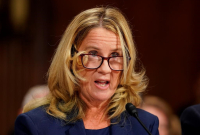Support strong Canadian climate journalism for 2025
They're young, motivated, and have a plan to impact the future.
Nicole Davies hopes to support Indigenous knowledge about food sustainability, by listening and learning from established programs and empowering emerging initiatives.
Maxime Fortin Faubert will work towards transforming contaminated lands in Montreal into green spaces, which could improve the environment and help clean up the lands.
Tara Mahoney will research ways that successful campaigns have mobilized Millennials and experiment with those techniques to spread the word on community renewable energy.
All three have been awarded $50,000 one-year David Suzuki Fellowships, which are designed to support the environmental leaders of the future.
“Climate change is the defining challenge of our time,” David Suzuki said. “But we’re caught in an age when communication challenges are impeding our ability to solve major environmental issues. We must develop new generations of scientists who not only excel in laboratories and in the field, but also tell stories and communicate effectively to engage masses of people in the global shift toward a clean energy economy.”
Not just one person's responsibility to save the world
The fellowships were made possible by a gift for David Suzuki’s 80th birthday last year, said Harpreet Johal, the David Suzuki Foundation’s senior specialist of fellowships.
“David Suzuki unfortunately isn’t going to be around forever,” Johal said in an interview. “Regardless, it shouldn’t just be one person’s responsibility to save the world. It’s all of ours. Each one of us as the ability to make a big difference and we want to invest in the next generation.”
Davies, who is First Nations from the Saulteaux Anishinaabe and Métis nations, will be based in Toronto. She has a master’s degree in Indigenous governance from the University of Victoria and will focus on Indigenous sustenance sovereignty.
“The first thing I want to do is reach out to existing strong, robust initiatives that are doing the good work of revitalizing their traditional sustenance practices and figuring out how to leverage this fellowship to give benefit to them,” Davies said in an interview.

When asked for an example of an inspiring initiative engaged in Indigenous sustenance sovereignty work, Davies named the Sacred Seeds Collective, an Ontario organization that is working to revitalize traditional foods, including traditional seed keeping and sharing and delivering fresh produce and medicines to communities in downtown Toronto and across Ontario.
Faubert is working on his PhD in biological sciences at the Université de Montréal, researching ways to decontaminate polluted soils using plants. He’s going to map contaminated lands on the Island of Montreal and then approach landowners to educate them about the potential of using plants to speed up the natural decontamination process and to mitigate the heat island effect.
“There is a lot of contaminated land in Montreal and the most common strategy to solve this problem is excavation followed by landfill – the so-called dig and dump strategy,” Faubert said. “It’s a fast and simple strategy, but it doesn’t really solve the problem, it just moves the contaminated land elsewhere.”
Because it’s extremely expensive, landowners often leave lots vacant for decades, Faubert said.
He wants to change those vacant lots into green space, which will improve Montreal’s resilience to climate change.
Black Lives Matter, Idle No More, #MeToo and...renewables?
Mahoney, who is completing her PhD in communication at Simon Fraser University, will be based in Vancouver. She’s going to try to understand how to leverage media and culture to spread the word about renewable energy.
“The first step is to look at a broad range of campaigns, movements and organizations that are really leading in engaging millennials in social and political issues, so movements like Black Lives Matter, Idle No More, and Me Too, … that have really been able to utilize media-based social movements and translate those into effective progress on policy issues and other types of social changes,” Mahoney said in an interview.
After she’s figured out some strategies, she will test them out at the David Suzuki Foundation, working on the Charged Up initiative for renewable energy.
These three are the second cohort of fellows and the foundation has three years of guaranteed funding, but hopes to continue the fellowships indefinitely.
Tracy Sherlock writes about B.C. politics for the National Observer. Send story tips to [email protected].
This article has been updated since it was first published for clarification.




Comments